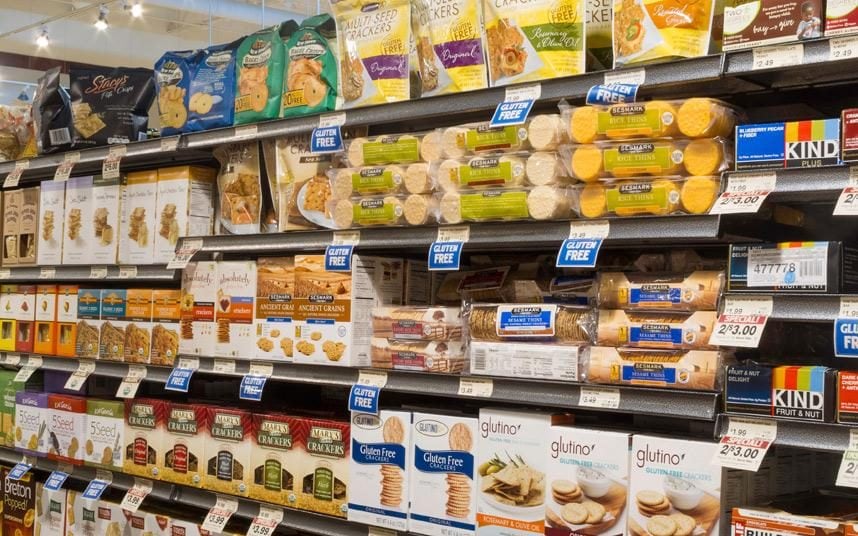Going gluten-free is necessary for some, not a fad
3 min read
Gluten free foods can hurt those without gluten sensitivities. (Telegraph.co.uk)
By ABIGAIL WEBER
Staff Writer
It’s no secret that gluten-free dieting has exploded in recent years, prompted by an increase in awareness and celebrity endorsements. As someone who has to be gluten-free for medical reasons, I have a complicated relationship with people who go gluten-free for some nebulous “health benefit.”
On my third week of being gluten-free, some friends invited me to Giant with them. I mostly avoided thinking about my new restrictions: I read the signs at the UC, sighed at every innocent-looking dish with a gluten warning, and spent most of my meals eating from Simple Servings. At Giant, I expected to spend my time frantically googling which of my favorite foods I could still eat. To my surprise, I discovered that the Giant has an entire aisle dedicated to gluten-free products.
I didn’t spend much time there, though, grabbing a box of cookies and hurrying to catch up with my friends. On some level, I was embarrassed to be seen in the aisle. I’m a blonde white girl from suburbia; I look like the stereotypical fad dieter.
Although the gluten-free diet has existed since Willem-Karel Dicke wrote about it as a treatment for children with celiac disease in the 1950s, it rose to fame in the United States due in part to celebrities like Gwyneth Paltrow selling it as everything from a weight-loss aid to a cure for poor anger management.
“11 percent of U.S. households follow a gluten-free diet,” said market researchers NPD Group in 2014. “Only 25 percent of those living in a gluten-free home say celiac disease or gluten sensitivity is the main reason.”
For people with celiac disease or non-celiac gluten sensitivity, going gluten-free isn’t a choice, but a lifestyle necessity. Celiac disease is an autoimmune disorder in which gluten consumption damages the small intestine, causing mineral and vitamin deficiencies like anemia along with a wide variety of other symptoms and increased risk of developing other complications. Non-celiac gluten sensitivity (NCGS) is an umbrella term for those with similar symptoms who test negative for celiac disease. Celiac disease affects approximately one percent of the population, according to BeyondCeliac.
“There’s no benefit to a gluten-free diet for those who don’t have a medical reason for it,” reported the University of Chicago Celiac Disease Center. In fact, going gluten-free can cause health concerns of its own: many whole grains contain gluten, and gluten-free diets can lack other essential vitamins and minerals. For people with celiac or NCGS, this is simply a trade-off from one type of deficiency to an ultimately healthier, manageable one. For those who don’t, this is an unnecessary loss that few take the necessary steps to educate themselves on and balance out.
With the advent of the diet’s popularity among people who ignorantly hopped on the trend, comedians rose to mock it—mocking those who need to be gluten-free for survival in the process. Even popular movies like Deadpool 2 and Angry Birds make cheap, offhand jokes scoffing at the idea of gluten-free diets that make it even harder to take it seriously.
Still, there are hidden benefits to the diet’s popularity among those who don’t have a diagnosis. According to BeyondCeliac, 83 percent of celiac sufferers are misdiagnosed or undiagnosed, while a correct diagnosis takes an average of 6-10 years. There’s a high chance that some of those people hopped on the trend and improved their health–just not in the way they expected.
With this in mind, the gluten-free aisle at Giant probably doesn’t exist to benefit the one percent suffering from celiac disease.
“The global gluten-free products market size was estimated at USD 21.61 billion in 2019,” said Grand View Research, a number their report expects will increase in the next few years.
For better or for worse, the gluten-free diet is ingrained in the economic and social fabric of the U.S. While vapid fad dieters and media mockery might be irritating and trivializing, there are still benefits. For one thing, I can eat premade cookies with my friends without fearing the effects of gluten.











